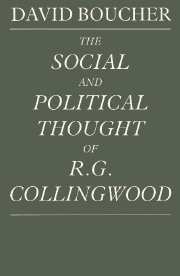Book contents
- Frontmatter
- Contents
- Preface
- 1 Collingwood in context
- 2 The New Leviathan in context
- 3 The two Leviathans and the criteria of rational action
- 4 The development of the European mind
- 5 Collingwood's liberal politics
- 6 The state and the body politic
- 7 The process of civilization
- 8 Conclusion: civilization and its enemies
- Notes
- Index
2 - The New Leviathan in context
Published online by Cambridge University Press: 05 June 2012
- Frontmatter
- Contents
- Preface
- 1 Collingwood in context
- 2 The New Leviathan in context
- 3 The two Leviathans and the criteria of rational action
- 4 The development of the European mind
- 5 Collingwood's liberal politics
- 6 The state and the body politic
- 7 The process of civilization
- 8 Conclusion: civilization and its enemies
- Notes
- Index
Summary
Introduction
This chapter is principally addressed to determining the place of The New Leviathan in Collingwood's long-term intellectual concerns. One such concern was the idea of a scale of forms. The theory of a scale of forms which is expressed in An Essay on Philosophical Method was formulated in Speculum Mentis and the moral philosophy lectures. The methodological considerations were excised from the lectures when the theory was published. The moral philosophy lectures form a large part of the subject matter of The New Leviathan. It is not surprising, then, that a version of the scale of forms, originally articulated in conjunction with the moral philosophy lectures, should emerge in The New Leviathan. Further, I argue that Collingwood's final work is in fact the culmination of his persistent endeavour to bring about rapprochements between philosophy and history, and between theory and practice. In this chapter the focus will be upon explaining what Collingwood understood the rapprochements between theory and practice, and history and philosophy, to entail. In this respect, it will be appropriate to give a brief indication of how these concerns become manifest in The New Leviathan. This is not to suggest a crude teleogical progression towards a culminating point. Indeed, the culminating point, for Collingwood, would have been The Principles of History. We therefore need to revert to various short-term considerations to explain why Collingwood produced The New Leviathan rather than the work on history which he had intended.
- Type
- Chapter
- Information
- The Social and Political Thought of R. G. Collingwood , pp. 27 - 62Publisher: Cambridge University PressPrint publication year: 1989



